Nautical Wall Lights:
The Complete UK Guide to Coastal & Maritime Outdoor Lighting
UK & EU Handcrafted Quality | Multiple Styles & Sizes | IP44-IP65 Weatherproof | Brass, Aluminium & Marine Grade Materials
Transform your property with authentic nautical wall lights that capture the timeless appeal of coastal and maritime design. From traditional fisherman’s lanterns to modern bulkhead lights, our comprehensive collection brings seaside character to homes, gardens, and commercial properties throughout the UK.
Whether you’re creating a full coastal theme or adding subtle maritime touches, nautical wall lights provide both practical illumination and distinctive style—indoors and outdoors.
Why Choose Nautical Wall Lights?
Authentic Maritime Character
Nautical wall lights draw inspiration from working harbours, lighthouses, ships, and coastal architecture—designs born from function, refined through heritage. These aren’t generic outdoor lights with nautical styling added as an afterthought; they’re authentic reproductions and interpretations of fixtures that have illuminated Britain’s coasts for generations.
Design heritage includes:
- Fisherman’s lanterns: Traditional harbour lights with angled shades
- Bulkhead lights: Ship-board fixtures designed for demanding marine environments
- Well glass lights: Industrial coastal architecture lighting
- Swan neck brackets: Classic harbour and pier lighting
- Porthole-style fixtures: Authentic maritime aesthetic
This rich heritage translates to distinctive character that generic outdoor lighting simply cannot match. Nautical wall lights tell stories—of harbours at dawn, coastal cottages, working boats, and seaside traditions.
Versatility: Indoor & Outdoor Applications
Modern nautical wall lights suit far more than coastal properties. Their robust construction, clean lines, and timeless appeal make them valuable additions to diverse architectural styles and settings.
Indoor applications:
- Kitchens (particularly coastal or country styles)
- Hallways and entrance areas
- Bathrooms (IP65-rated fixtures)
- Utility rooms and boot rooms
- Dining rooms and living spaces
- Commercial hospitality interiors
Outdoor applications:
- Front doors and entrance porches
- Garden walls and boundary lighting
- Covered patios and outdoor dining areas
- Pathway and driveway illumination
- Garage and outbuilding entrances
- Commercial premises and hospitality exteriors
Built for British Weather
Quality nautical wall lights are engineered for durability—originally designed to withstand harsh maritime environments. This heritage translates to fixtures that excel in our demanding British climate.
Weather protection standards:
- IP44: Protected against splashing water—suitable for covered locations
- IP54: Dust protected and water spray resistant—good for most outdoor positions
- IP64: Dust-tight and protected against powerful water jets
- IP65: Completely dust-tight and protected against water jets from any direction
The higher the IP rating, the more exposed the position it can handle. Our collection includes fixtures across this spectrum, ensuring you can specify appropriate protection for each location.
Our Nautical Wall Light Collections
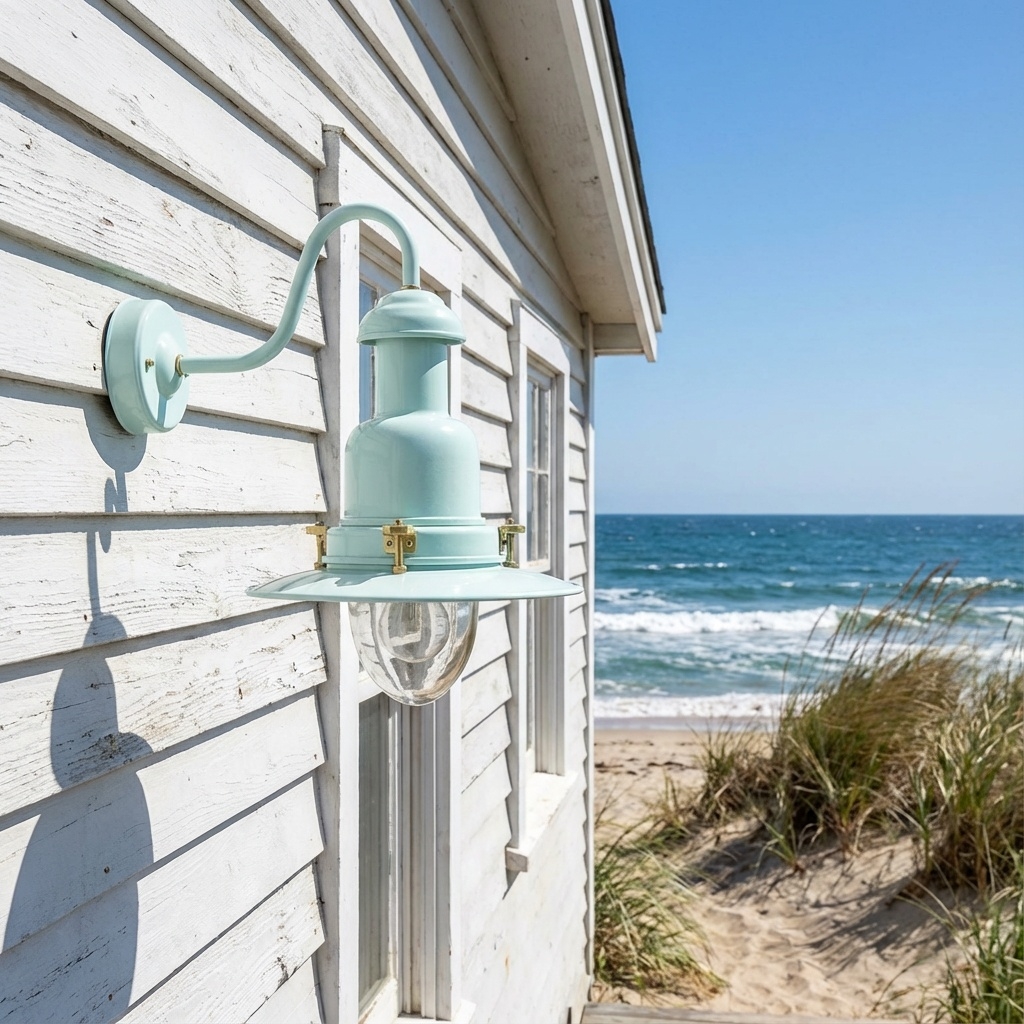
Fisherman’s Wall Lights: Traditional Harbour Lanterns
Our signature collection—handcrafted in the UK from spun aluminium with authentic nautical character. These are the lights that started our business and remain our most popular nautical fixtures.
Available in two sizes:
- Standard (26cm diameter): Perfect for cottages, small porches, tight spaces
- Large (32cm diameter): Ideal for standard doors, garden walls, most applications
The Harbour Light: Simplified Coastal Style
For those preferring pared-back nautical aesthetics, The Harbour Light offers the same UK handcrafted quality as our Fisherman’s lights in simplified form, available as 32cm Dia – Same dimensions as Large Fisherman’s Light.
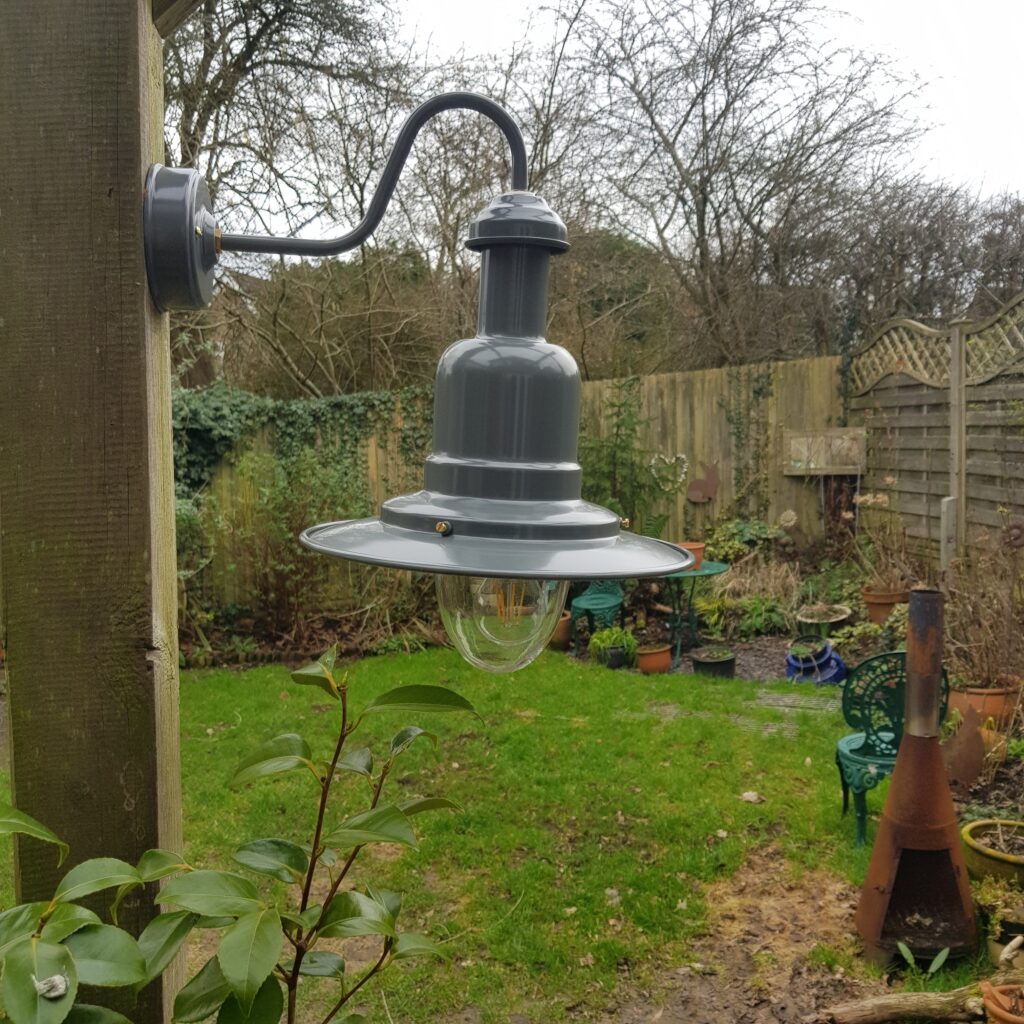
Key features:
- Handmade in UK workshops from spun aluminium
- Traditional angled shade directing light downward
- Clear glass with brass clasp fittings
- IP44 weatherproof rating
- 5 powder-coated finishes: Satin Black, Slate Grey, Chalk White, Seaspray Blue, Traditional Cream
- Made to order (12-15 working days)
- Optional PIR motion sensors available
Explore Fisherman’s Wall Lights →
Quayside Nautical Wall Lights: Compact Maritime Style
British-made nautical wall lights offering excellent value without compromising on quality or authenticity.
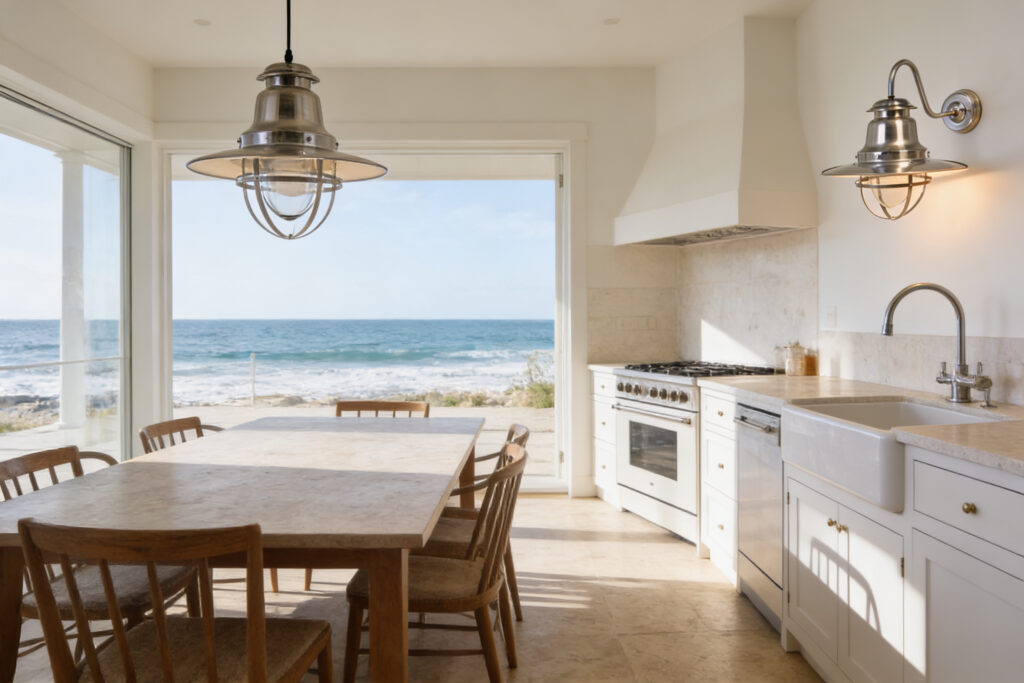
The Quayside: Traditional Caged Wall & Pendant versions
- Handmade in UK workshops from spun aluminium
- Traditional angled shade directing light downward
- Clear glass with caged sheild
- IP44 weatherproof rating
- 5 powder-coated finishes: Satin Black, Slate Grey, Chalk White, Seaspray Blue, Traditional Cream
- Made to order (12-15 working days)
Best for:
Traditional coastal properties, cottages, properties wanting authentic fisherman’s lantern character, entrance lighting, garden walls.
Need an Industrial Look? All The Quayside, Fisherman’s & Harbour Wall Lights can be supplied as a raw industrial finish, or brushed or Polished.
Ideal for the Industrial look kitchen or coastal interior. Look at how this is achieved – (for indoor use only)
Bulkhead Wall Lights: Authentic Ship-Style Fixtures
Originally designed for ship-board use, bulkhead lights provide robust, practical illumination with unmistakable maritime character. Our collection includes various styles from compact to substantial.
Oval & Round Specialty Bulkhead Lights
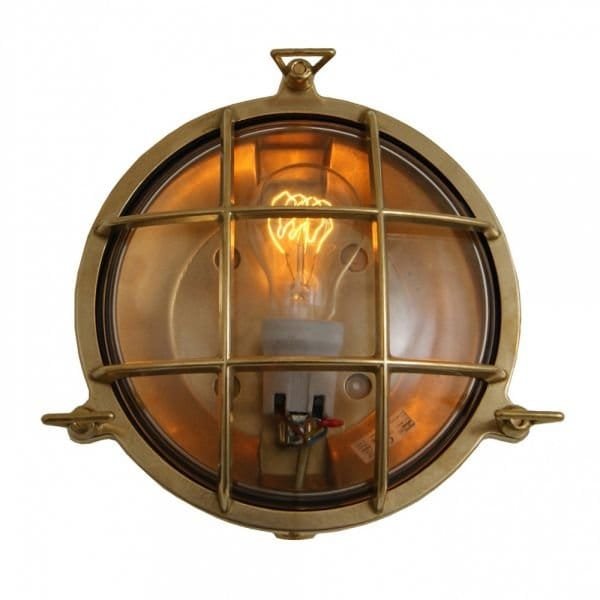
Adoo Marine Nautical Wall Light IP54 | Choice of Glass
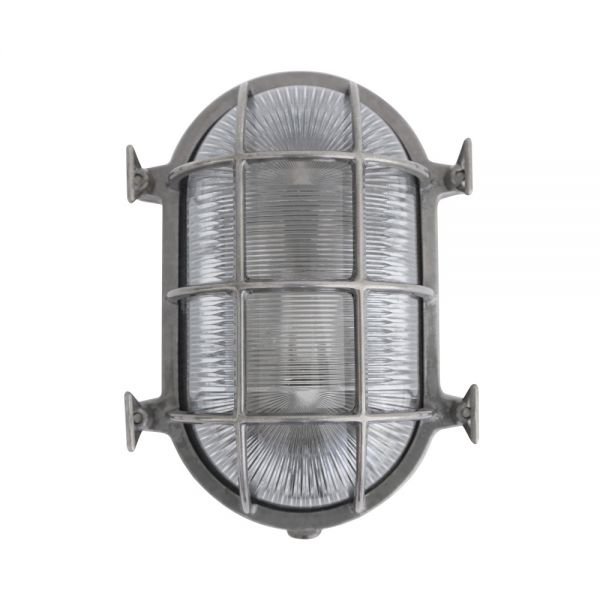
Ross Marine Nautical Bulkhead Wall Light IP54
Best for:
Properties wanting authentic ship-style lighting, modern industrial-nautical fusion, coastal commercial premises, exposed positions requiring robust fixtures.
Well Glass Wall Lights: Industrial Coastal Elegance
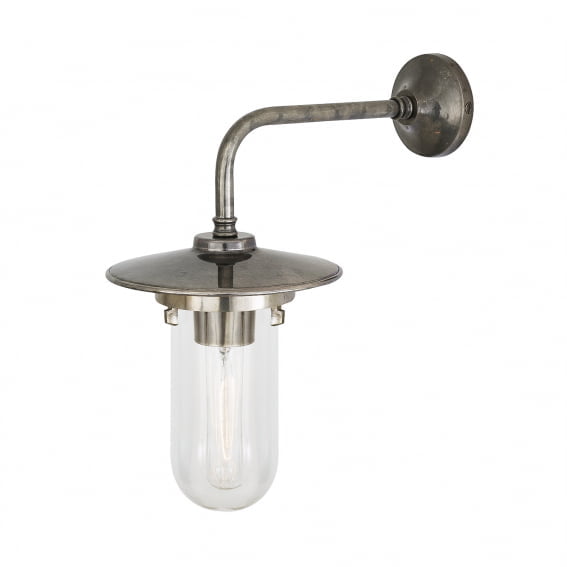
Well glass lights feature protective glass cylinders (wells) surrounding the bulb.
Originally designed for industrial coastal architecture and harbour buildings.
These substantial fixtures make confident statements.
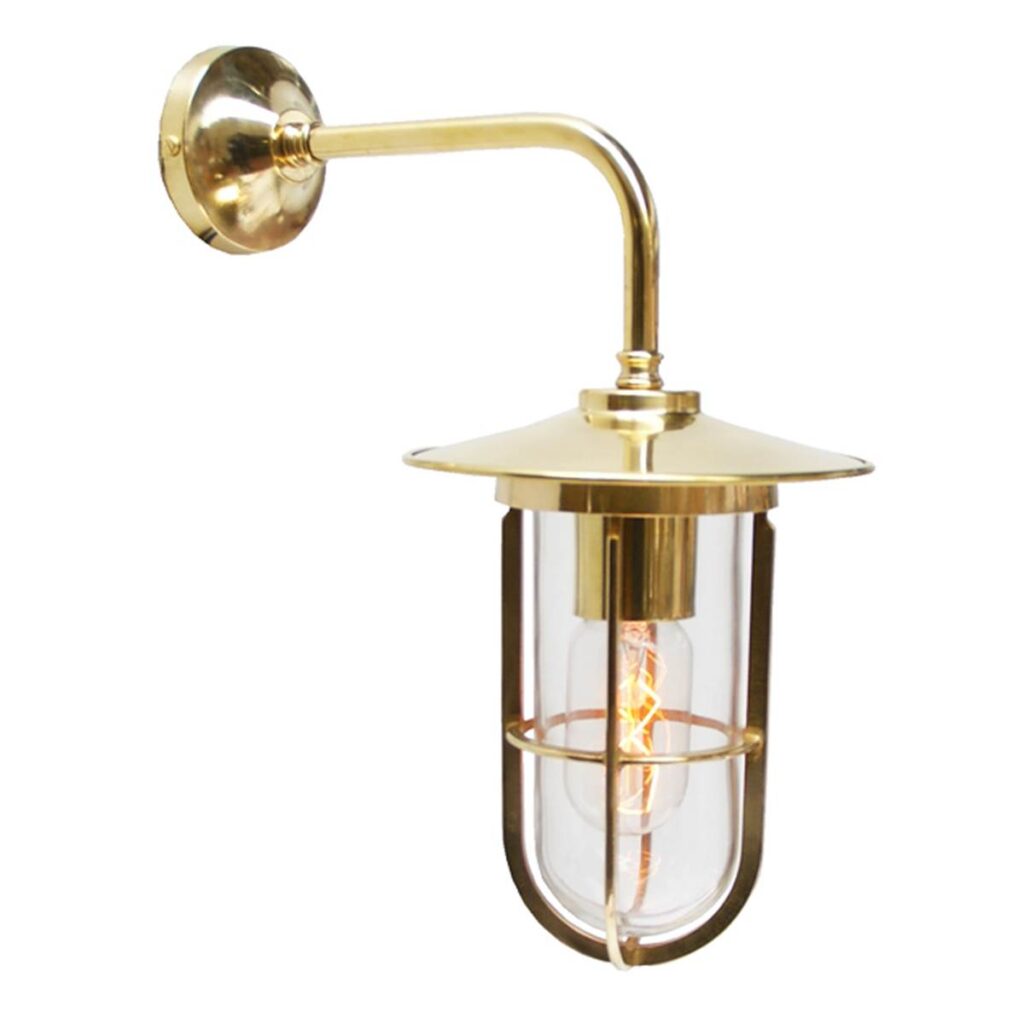
Best for:
Exposed outdoor positions, period properties, industrial-style interiors, properties wanting substantial fixtures, barn conversions, commercial architecture.
See All Our Well Glass Lights →
Solid Brass Nautical Lights: Premium Marine-Grade Quality
For properties demanding the ultimate in durability and authentic maritime character, solid brass nautical lights represent premium craftsmanship proven through generations of coastal service.
Why Solid Brass Outlasts Everything Else
Originally specified for working ships and harbour installations, solid brass offers unmatched longevity in demanding marine environments:
Natural Corrosion Resistance
- Salt spray immunity: Brass naturally resists corrosion from coastal salt exposure—essential for seaside properties
- No rust ever: Unlike steel or iron fixtures that corrode from inside out, brass remains structurally sound indefinitely
- Weather proof construction: Handles rain, frost, UV exposure, and temperature extremes without degradation
Superior Build Quality
Premium EU-manufactured brass fixtures demonstrate exceptional engineering:
- Heavy cast construction: Thick walls, robust screw threads, reliable seals—built to withstand decades of service
- Precision machining: Accurate tolerances ensure proper gasket seals and long-term weatherproofing
- Marine-grade materials: Not just brass finish—solid brass throughout structural components
- Accurate IP ratings: Properly tested and certified, unlike mislabeled imports
Beautiful Aging
Where painted finishes flake and corrode, brass improves with age:
- Natural patina development: Unlacquered brass develops warm, weathered character that blends beautifully with stone, brick, timber, and render
- Lacquered option: Maintains bright brass appearance with protective clear coating
- Zero maintenance aesthetics: Looks better each year without painting or refinishing
Our Brass Nautical Wall Light Collection
We stock carefully selected solid brass fixtures from established European manufacturers known for marine-quality construction:
Fabo Well Glass Swan Neck IP65
- Traditional swan neck bracket with well glass shade
- Maximum IP65 weather protection
- Solid brass construction throughout
- Authentic coastal character
Cebu Brass Grille IP65
- Protective brass grille over glass dome
- Exceptional IP65 protection
- Statement fixture for exposed positions
- Premium solid brass quality
Ardle Well Glass IP65 (Ripple Shade)
- Textured ripple glass for decorative effect
- Bathroom and outdoor rated (IP65)
- Solid brass traditional styling
- Suitable for heritage properties
Adoo Marine Bulkhead IP54
- Classic round bulkhead design (21cm)
- Choice of clear, frosted, or prison glass
- Solid brass or chrome finish options
- Authentic ship-board styling
Perfect Applications for Brass Nautical Lights
Coastal & Seafront Properties
Brass is the natural choice for salt-air environments:
- Seaside cottages and beach houses
- Harbour-front properties and marina developments
- Coastal garden walls and boundary lighting
- Boat sheds and outbuildings in marine locations
Why it matters: Cheap metal fixtures rust rapidly in coastal conditions—brass immunity to salt corrosion means decades of reliable service without replacement.
Period Properties & Heritage Renovations
Brass lighting enhances traditional architecture authentically:
- Stone cottages and country properties
- Barn conversions maintaining heritage character
- Period doorways and entrance porches
- Listed buildings requiring sympathetic fixtures
The natural patina that develops on unlacquered brass complements aged stonework, timber beams, and traditional materials beautifully—looking more authentic with each passing year.
Commercial Hospitality & Retail
- Boutique hotels and coastal B&Bs
- Seafood restaurants and harbour-front dining
- Brewery taprooms and craft beverage venues
- Retail premises seeking premium nautical aesthetic
Commercial properties benefit from brass durability—fixtures that withstand constant use and high traffic while maintaining premium appearance.
Brass Finish Options
Unlacquered Brass (Natural Patina)
- Develops warm, weathered character over time
- Authentic maritime aging process
- Blends beautifully with traditional materials
- Zero maintenance required (or polish occasionally if preferred)
Lacquered Brass (Bright Finish)
- Maintains polished brass appearance
- Clear protective coating prevents tarnishing
- Traditional bright metallic look
- Wipe clean with soft cloth and mild soap only
Caring for Brass Nautical Lights
Brass fixtures require minimal maintenance yet reward you with decades of service:
For Unlacquered Brass
- Natural aging: Expect brass to darken and develop patina—this is desirable
- Light cleaning: Wipe with mild soap and water to remove dirt
- Optional polishing: Use brass cleaner sparingly if you prefer brighter appearance
- Coastal locations: Rinse quarterly with fresh water to remove salt deposits
For Lacquered Brass
- Gentle cleaning: Soft cloth with warm soapy water only
- Avoid: Metal polish, abrasive pads, harsh chemicals (damages protective lacquer)
- Protection: The lacquer prevents natural patina development
General Maintenance
- Check gaskets every few years to ensure weather seals remain effective
- Ensure drain holes (if present) remain clear
- Replace bulbs with quality LEDs for maximum efficiency and longevity
💡 Brass vs Aluminium: Which to Choose?
Brass: Premium aesthetics, natural patina aging, ultimate coastal durability, heritage character. Higher initial cost, exceptional longevity.
Aluminium (our UK-made Fisherman’s lights): Rust-proof, lighter weight, powder-coated colour options, handcrafted UK quality. Better value, excellent durability.
Both resist corrosion completely—choose brass for premium traditional character, aluminium for colour choices and UK craftsmanship.
Browse All Brass Nautical Wall Lights →
Choosing the Right Nautical Wall Light
By Location & Weather Exposure
Covered porches and entrances:
- Minimum IP44 rating sufficient
- Fisherman’s Wall Lights (Standard or Large)
- Harbour Light
- Quayside fixtures
- Most bulkhead styles
Exposed exterior walls:
- IP54-IP65 rating recommended
- Well glass wall lights (all IP65)
- Higher-rated bulkhead lights
- Cebu Brass Grille IP65
Indoor applications (kitchens, hallways):
- Any fixture suitable
- Style and aesthetics primary consideration
- Lower IP ratings acceptable (though higher-rated fixtures work perfectly indoors)
Bathrooms:
- IP65 rating essential
- Well glass wall lights collection
- Lena, Florin, Ardle models specifically
Garden walls and pathways:
- IP54 minimum, IP64-IP65 preferred for exposed positions
- Consider spacing: 2-3m for smaller lights, 3-4m for larger fixtures
By Property Style
Traditional cottages and period properties:
- Fisherman’s Wall Lights in Traditional Cream or Chalk White
- Brass well glass lights for heritage appeal
- Quayside in silver or cream finishes
Coastal and seaside homes:
- Any nautical fixture works—this is their natural habitat
- Seaspray Blue Fisherman’s lights for authentic coastal color
- Bulkhead lights for authentic maritime character
- Well glass lights for substantial presence
Modern and contemporary properties:
- Harbour Light for pared-back nautical references
- Black or slate grey finishes
- Bulkhead lights for industrial-nautical fusion
- Clean-lined well glass fixtures
Barn conversions and rural properties:
- Well glass wall lights suit industrial agricultural architecture
- Larger Fisherman’s lights for scale
- Traditional cream or grey finishes
Commercial and hospitality:
- Robust construction essential
- Bulkhead lights for authentic maritime theme
- Well glass lights for substantial presence
- Consider emergency-rated fixtures where required
By Size and Scale
Small spaces, compact doors, tight positions:
- Standard Fisherman’s (26cm)
- Small bulkhead lights (14-16cm)
- Muara flush mount
- Ergo small round
Standard residential applications:
- Large Fisherman’s (32cm)
- Harbour Light
- Standard bulkhead lights (21-26cm)
- Quayside fixtures
Grand entrances, large walls, statement lighting:
- Well glass wall lights (substantial presence)
- Clayton double well glass
- Larger bulkhead fixtures
- Multiple smaller fixtures grouped
Nautical Wall Light Finishes Explained
Metal Finishes
Solid Brass – Natural or Antique
- Premium material with heritage appeal
- Develops natural patina over time
- Naturally corrosion-resistant
- Suits period and coastal properties
- Higher initial cost, exceptional longevity
Chrome and Polished Finishes – Indoor Only
- Modern, reflective appearance
- Marine-grade construction resists corrosion
- Contemporary nautical aesthetic
- Requires occasional polishing to maintain shine
Antique Silver – Indoor Only
- Weathered, aged appearance
- Suits rustic and heritage properties
- Less maintenance than polished finishes
- Authentic vintage character
Powder-Coated Finishes
Satin Black
- Contemporary sophistication
- Bold contrast against light walls
- Modern industrial-nautical fusion
- Low maintenance, durable
Slate Grey
- Versatile neutral
- Suits both traditional and modern
- Harmonizes with stone and natural materials
- Understated elegance
Traditional Cream
- Heritage authenticity
- Warm, welcoming tone
- Suits period properties
- Country-coastal aesthetic
Chalk White
- Classic coastal aesthetic
- Traditional seaside character
- Bright Matt finish, welcoming appearance
- Resists yellowing (unlike paint)
Seaspray Blue
- Authentic coastal color
- Distinctive maritime character
- Weathered, vintage appeal
- Perfect for seaside properties
Raw Aluminium – Indoor Only
- Industrial Look
- Choose -Natural, Brushed or Polished
- Contemporary Look
- Perfect for Loft – Industrial style
Practical Considerations
Installation Requirements
All nautical wall lights require electrical connection. For outdoor installations:
Use qualified electricians for:
- New electrical circuits or extensions
- First-time outdoor lighting installations
- Any work requiring cable burial
- Bathroom installations (special location regulations)
UK Building Regulations Part P governs outdoor electrical work. Professional installation ensures compliance, safety, and insurance validity.
View our complete installation guide →
Energy Efficiency
All fixtures accept standard E27 (ES) Edison Screw bulbs. We strongly recommend LED bulbs:
LED advantages:
- 80% less electricity than incandescent equivalents
- 6-9W LED = 40-60W incandescent light output
- 25,000-50,000 hour lifespan (20+ years typical use)
- £40-42 annual saving per fixture at current UK rates
- Instant brightness, cool operation
For nautical fixtures: Warm white LED (2700-3000K) in clear glass showcases vintage filament bulbs beautifully, enhancing the maritime aesthetic while providing modern efficiency.
Optional Enhancements
Corner Brackets
- For installations at building corners
- Angle-adjustable mounting
- Maintains proper fixture orientation
PIR Motion Sensors
- Available for many fixtures
- Activates lights automatically when movement detected
- Reduces energy consumption by 60-80%
- Enhances security
- Adjustable sensitivity and duration
Maintenance & Longevity
Routine Care
Quarterly cleaning:
- Wipe with soft cloth and mild detergent
- Remove salt deposits in coastal locations (rinse with fresh water)
- Clean glass inside and out for optimal light output
Annual inspection:
- Check gaskets and seals remain intact
- Verify fixtures remain securely mounted
- Inspect for any water ingress signs
- Test PIR sensors if fitted
Replacement Parts
Quality nautical lights are designed for serviceability:
- Glass shades often replaceable
- Gaskets and seals available as spares
- Lamp holders serviceable
- Standard mounting components
This approach ensures fixtures last decades rather than requiring complete replacement after a few seasons.
Why UK & EU Manufacturing Matters
Quality You Can Trust
Our handcrafted UK fixtures and premium EU-manufactured nautical lights share commitment to quality:
UK handmade (Fisherman’s, Harbour, Quayside):
- Individual attention at every stage
- Traditional metalworking skills
- Comprehensive testing before dispatch
- Supporting British manufacturing heritage
- 12-15 working day lead times justify exceptional quality
EU manufactured (bulkhead and well glass collections):
- Professional manufacturing standards
- Quality materials and construction
- CE certified and tested
- Established manufacturers with proven track records
Both approaches prioritize longevity over disposability—these are fixtures built for decades, not seasons.
Frequently Asked Questions
What’s the difference between Fisherman’s Wall Lights and bulkhead lights?
Fisherman’s lights feature angled shades directing light downward—inspired by traditional harbour lanterns. Bulkhead lights have protective cages or domes—originally ship-board fixtures. Both are authentically nautical; choose based on aesthetic preference and the level of weather protection needed.
Which IP rating do I need?
IP44 suits most covered outdoor locations (porches, eaves). IP54-IP64 for exposed walls and harsher conditions. IP65 for maximum protection (fully exposed positions, bathrooms, coastal properties). Higher ratings work everywhere lower ratings do, so when in doubt, choose higher protection.
Can I use nautical wall lights indoors?
Absolutely! Nautical lights work beautifully in kitchens, hallways, bathrooms (IP65 required), and living spaces. The robust construction designed for outdoor use means they’re virtually indestructible indoors.
How do I choose between different styles?
Consider your property’s character and the look you want. Traditional cottages suit Fisherman’s lights or brass fixtures. Modern properties work with simplified Harbour lights or industrial bulkheads. Coastal properties embrace any nautical style—it’s their natural aesthetic home.
What size nautical wall light do I need?
Consider your door width and wall space. Compact lights (14-21cm) suit small doorways and tight spaces. Standard sizes (26-32cm) work for most residential applications. Larger well glass fixtures (substantial presence) suit grand entrances and exposed walls. When uncertain, slightly larger tends to look more balanced.
How long do these lights last?
Quality nautical lights last decades with minimal maintenance. Aluminium and brass don’t rust, powder coating is exceptionally durable, and most components are serviceable or replaceable. Expect 20-30+ years of service—these are genuine long-term investments.
Do nautical wall lights work with smart home systems?
Yes—fit compatible E27 smart LED bulbs for app or voice control. The fixtures themselves are passive, so all “smart” functionality comes from your bulb choice.
Can I install these in coastal locations?
Definitely—they’re designed for it! Choose higher IP ratings (IP64-IP65), and rinse quarterly with fresh water to remove salt deposits. Aluminium and brass naturally resist corrosion, making them ideal for seaside properties.
How far apart should outdoor wall lights be spaced?
For standard residential applications, space nautical wall lights 2-3m apart for adequate pathway and entrance illumination. Larger fixtures like Well Glass lights can be spaced 3-4m apart. For purely ambient lighting, you can extend spacing, but for security and safety, closer spacing prevents dark zones between fixtures.
Will brass nautical lights tarnish outdoors?
Unlacquered brass naturally develops a warm patina—this is desirable and part of the authentic maritime look. Lacquered brass finishes maintain their bright appearance with protective coating.
Are brass lights suitable for exposed coastal weather?
Yes. Brass is one of the best metals for resisting salt spray and corrosion in coastal environments. It naturally withstands marine conditions better than most alternatives.
Do brass nautical lights rust?
No. Brass cannot rust. Unlike cheaper steel or iron imports that corrode rapidly, solid brass remains structurally sound indefinitely.
Complete Your Nautical Lighting Scheme
Coordinate wall lights with matching collections for cohesive maritime themes throughout your property:
Nautical Pendant Lighting: Ceiling-mounted fixtures for kitchens, dining rooms, and hallways
Fisherman’s Pendant Lights: Match our wall lights perfectly with identical finishes
Cottage Lighting: Traditional fixtures complementing coastal character
Barn & Stable Lights: Rustic outdoor lighting for rural-coastal fusion
Ready to Bring Maritime Character to Your Property?
Browse our complete nautical wall light collection:
✓ Traditional fisherman’s lanterns (UK handmade)
✓ Simplified harbour lights (contemporary coastal)
✓ Authentic bulkhead fixtures (ship-style)
✓ Industrial well glass lights (statement pieces)
✓ IP44 to IP65 weather protection
✓ Multiple sizes for every application
✓ Brass, aluminium, and marine-grade materials
✓ Indoor and outdoor versatility
Explore All Nautical Wall Lights → Explore All Fisherman & Harbour Wall Lights →
Need Guidance?
Our team understands coastal and nautical lighting. We can guide you toward the perfect fixtures for your property, considering architecture, location, weather exposure, and aesthetic preferences.
💬 Contact: Use the form – we’ll get back as fast as we can!
📖 Resources: Installation Guide | Glass Replacement Guide
Fisherman’s Lights UK
Authentic Nautical & Maritime Lighting
Handcrafted quality | IP-rated weatherproof | Built for decades | Coastal character


